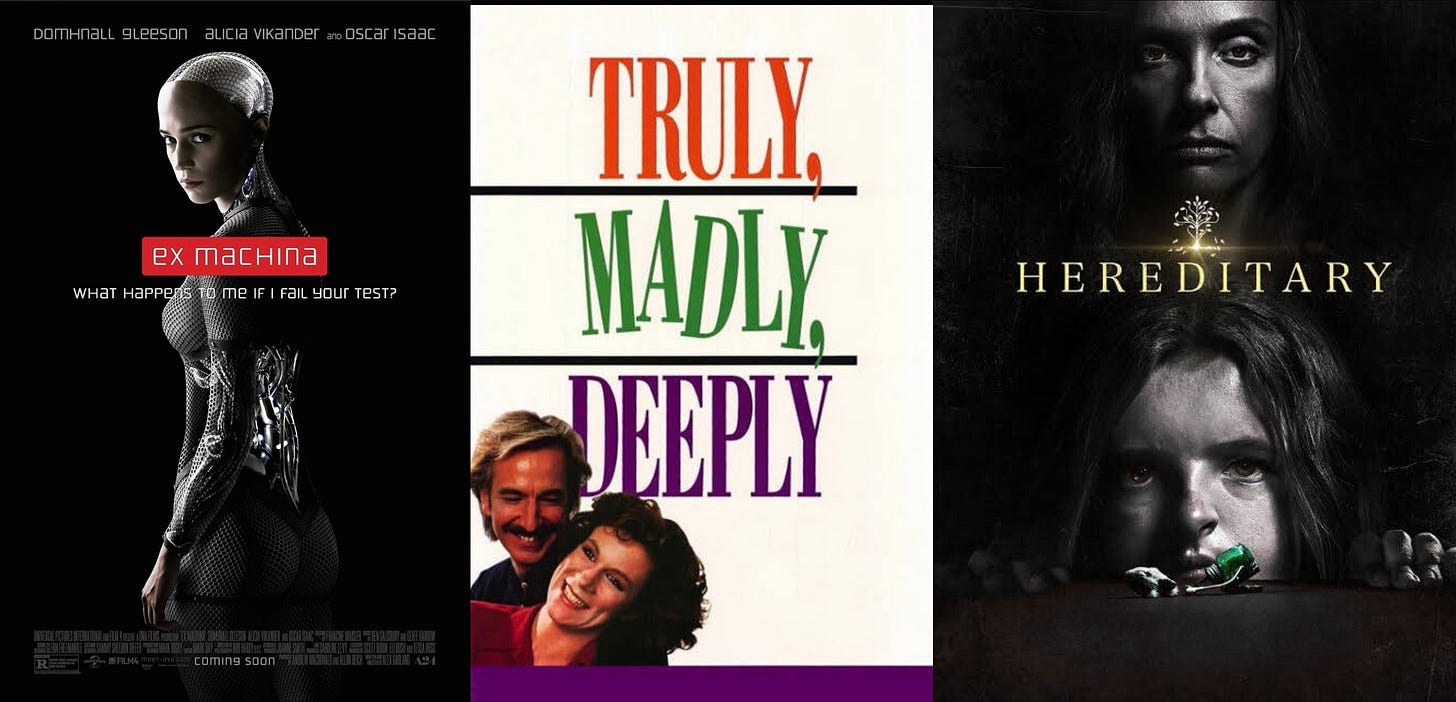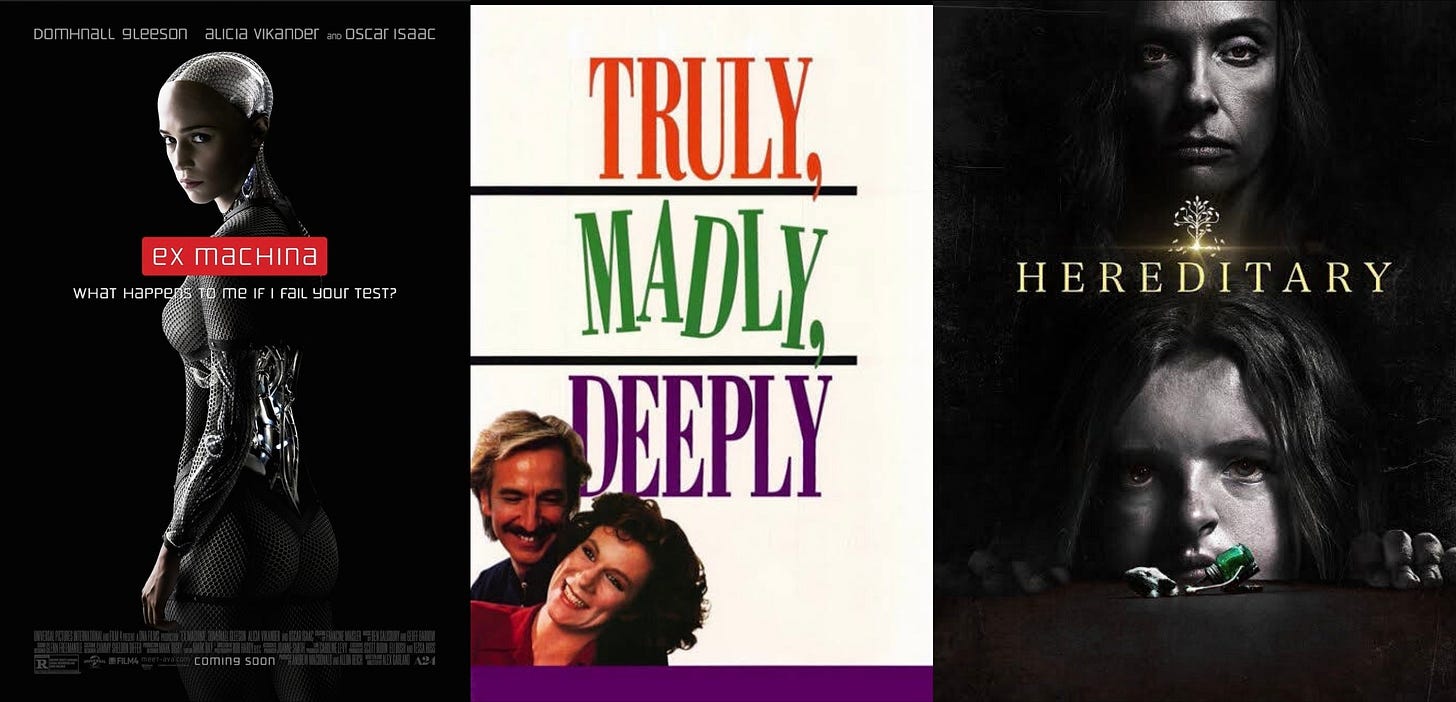This week, I watched three very different films – all of them related to the rewriting class I’m currently taking: Ex Machina (2014), Truly, Madly, Deeply (1990), and Hereditary (2018).
My instructor mentioned EX MACHINA, a science fiction film written and directed by Alex Garland, in our first class as a good example of establishing “the hook” in a screenplay. The Hook, for those unfamiliar with the term, is a narrative device that draws you into a story. It usually happens within the first few pages of a screenplay, the first few minutes of a film, or the first chapter of a book. There can be multiple hooks, but the first one - the main one - is the reason you keep reading/watching.
We read the first 5 pages of the screenplay for Ex Machina in class and learned the following: a smart young computer coder wins a contest at his work. The prize is to spend one week alone with the company’s uber wealthy, eccentric founder who is out there in more ways than one. Not only is he a genius, but he also lives in the middle of Alaska, so far from civilization it takes a multi-hour helicopter ride to reach him (over his own land). The coder has no idea what to expect, is a little nervous, but also very excited for the opportunity.
The instructor was right. Reading those first few pages made me want to know what happens next. That night I watched the film and within 10 or so minutes knew the entire premise – the programmer has been brought here to test a new Artificial Intelligence, a beautiful young woman, that the reclusive founder has created. And it goes from there.
I’m not going to spoil what happens, but if you haven’t seen it, you should. It’s smart, well acted, and has interesting twists that you don’t see coming.
Also, considering the direction that AI is taking these days, it feels frighteningly plausible. It reminded me of themes in the TV show Battlestar Galactica, and even of the original Adam and Eve story from the bible, except a much darker, more terrifying version. The ending, to me, perfectly encapsulated the theme.
TRULY, MADLY, DEEPLY was recommended to me because it’s a movie about grief like the script that I’m rewriting. This film has been mentioned to me before, but this time it registered. The story follows a woman who is actively grieving the death of her partner, when he returns as a ghost and moves back in with her.
I loved this film for many reasons. Firstly, even though this is one of the most realistic depictions of grief I’ve ever seen, the film is overall, quite lighthearted and even funny in parts. I mean, look at the poster. It looks like a rom-com.
Secondly, the acting is superb. The woman is played by Juliet Stevenson, the man by the late, great Alan Rickman. And they have perfect chemistry.
Finally, the premise is brilliant—it’s a fantasy that anyone who’s ever lost someone has had. We’ve all fantasized about the person coming back. “If I could just see them one more time…”
For anyone who’s lost a lover, the scene when the partner comes back is so real and the woman’s range of emotions so believable – it’s one of those truly magical scenes that allows you to live vicariously. Through her, you get to feel what it would be like to have someone you loved and have been missing terribly suddenly appear before you in the flesh.
What follows from there is both endearing, hilarious, and believable. It wasn’t until the end that I realized it was written and directed by the late Anthony Minghella, but it made sense. I’m a big fan of Minghella, who made another movie about grief and love that I absolutely love, THE ENGLISH PATIENT (1996). I’ve probably watched it a dozen (at least) times.
HEREDITARY, a supernatural thriller written and directed by Ari Aster (his feature directorial debut, no less), was recommended to me because it’s also a movie about grief, albeit a very different kind. The story revolves around a family – and the strange things that start happening to it – after its mysterious grandmother dies. She has left several boxes of witchy stuff behind, and the family tries to resist its “inheritance” but, of course, cannot escape it.
Now, I don’t usually watch movies like this alone—I’m too much of a scaredy-cat. But I could handle this film. It wasn’t a jump-scare movie. It was a slow-burn, suspenseful movie that has a few nightmare-inducing moments (one moment in particular).
Toni Colette plays the witchy grandmother’s estranged daughter and the mother of the two kids that the strange things start happening to. The plot of the film is so-so. There were certain things that didn’t add up for me. But Colette’s performance is so on point and gut-wrenchingly raw, it elevates the entire film.
I also loved that slow-and-suspenseful pacing. Another film in the same genre that had similar slow pacing is THE WITCH (2015), written and directed by Robert Eggers.
All of these films, while wildly different from one another, had strong premises. Strong hooks that kept me engaged. I wanted to know what would happen in the next scene, and I couldn’t guess where they were heading, or how they would end (believe me, I was trying).
They also had strong themes… which didn’t become entirely clear until the very end, which was very satisfying as a viewer.
It all makes me think about how to restructure my own project. I’m still figuring that out, but it helps to read and watch other films for inspiration.
What are you watching?







I saw Truly Madly Deeply a few years ago and really enjoyed it. I’ve seen The English Patient several times—one of my all-time favorites. Another all-time favorite is Out Of Africa.